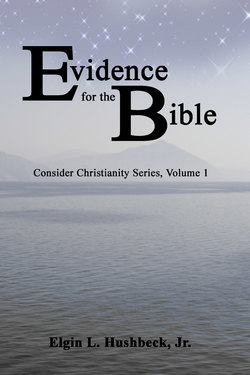Читать книгу Evidence for the Bible - Elgin L Hushbeck Jr. - Страница 7
На сайте Литреса книга снята с продажи.
INTRODUCTION
Оглавление‘Come now, let us reason together’, says the Lord.
(Isaiah 1:18)
There are two kinds of openness, the openness of indifference . . . and the openness that invites us to the quest for knowledge.
(Allan Bloom)1
It is quite popular today in many circles to regard the subject of religion as a spiritual pursuit in which, while the goal may be desirable, the route is not important. Pluralism reigns supreme. Committees have been formed in an attempt to build bridges between the differing religious traditions. Harmony and coexistence are the key words.
All this pluralism has not brought about a heightened awareness of our spiritual nature. It has not brought us closer to our Creator. If anything, the opposite is true. The belief that the path to God is irrelevant has, rightly or wrongly, led to the conclusion that God is irrelevant. The question can be asked: If it makes no difference how you get there, why go at all?
The only religious point of view that is currently shunned is the one that holds that there actually is a God who cares enough to have established a particular way of approaching Him. The idea that there are correct and incorrect ways of coming to God, that one religion is right and all the others are wrong, is repugnant to those wielding the banner of pluralism.
While many may consider the belief that there is only one acceptable way to God to be an arrogant position, it was the position held by Jesus Christ when He said of Himself in John 14:6, “I am the way and the truth and the life. No one comes to the Father except through me.” This is an arrogant statement unless, of course, it is true.
Today many people consider the claims of Christianity to be outdated and old fashioned. Society has outgrown its superstitious past. Science and reason provide a new foundation for civilization, one in which religion is no longer needed. Yet is this so?
This book takes the position that Christianity is not an outdated part of our superstitious past. When one considers all of the evidence, it is a rational, reasonable, and relevant religion. I believe and intend to show that God exists, that he has spoken to us, and that the written record of His revelation is the Bible. The Bible has not been corrupted through the years, but is an accurate and reliable record of God’s interactions with us. Central to the message of the Bible is the nature, purpose and work of Jesus Christ. It is a message that has relevance for us today. In short, Christianity is not a religion created by men, but a faith given by God.
The evidence for Christianity is both vast and extensive. This is the first in a series of books that will attempt to present some of this evidence. This volume will focus on the evidence for the Bible. Still, no single book could ever hope to cover it all. In a book of this size we can only begin to survey the subject. In the pages that follow, I will attempt to answer the major and most common questions that are asked by those who are skeptical regarding the reliability and inspiration of the Bible and to dispel many of the misconceptions that have arisen through the years.
Unfortunately, to answer every single question ever conceived would require a book so large that it would be unreadable. Since my hope is that this book and the other books in the series will be read, I have limited the discussion to the questions most often raised by critics. What I hope will be clear is that the weight of evidence is strongly in favor of Christianity and that as we begin the twenty-first century there remain compelling reasons to believe that the words of Jesus spoken 2000 years ago have relevance in our modern age.
